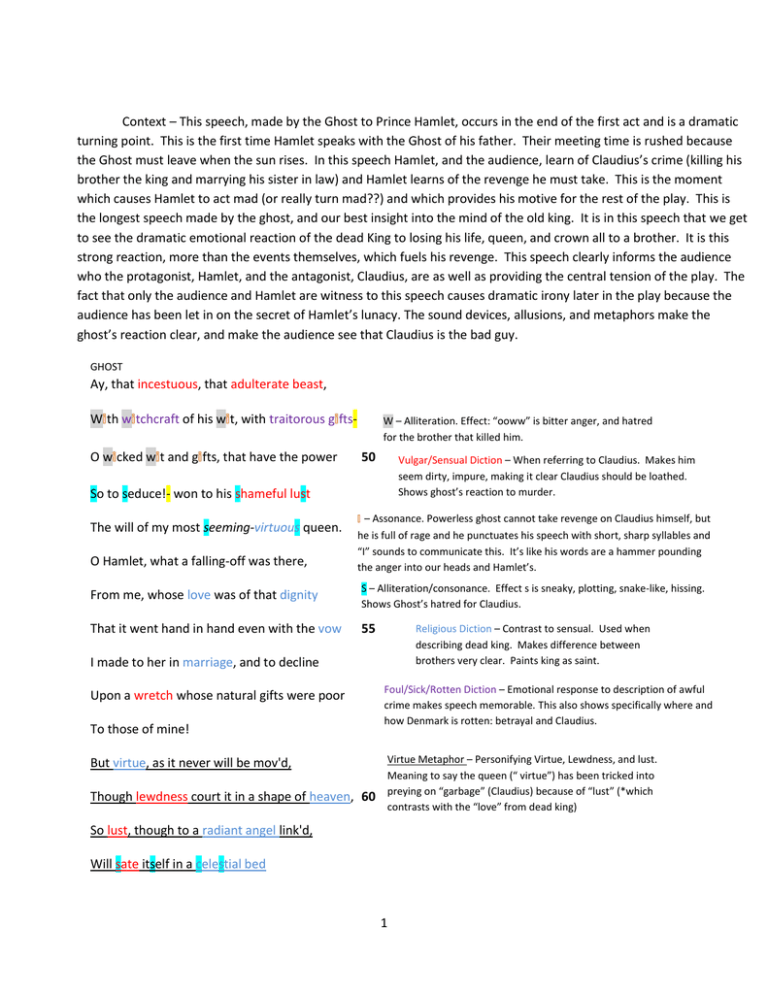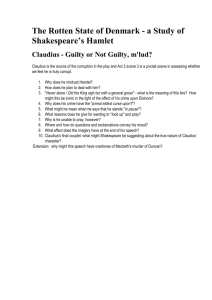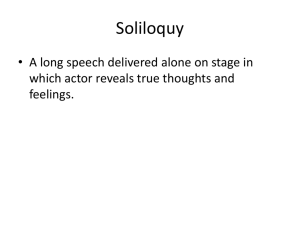Context – This speech, made by the Ghost to Prince Hamlet, occurs
advertisement

Context – This speech, made by the Ghost to Prince Hamlet, occurs in the end of the first act and is a dramatic turning point. This is the first time Hamlet speaks with the Ghost of his father. Their meeting time is rushed because the Ghost must leave when the sun rises. In this speech Hamlet, and the audience, learn of Claudius’s crime (killing his brother the king and marrying his sister in law) and Hamlet learns of the revenge he must take. This is the moment which causes Hamlet to act mad (or really turn mad??) and which provides his motive for the rest of the play. This is the longest speech made by the ghost, and our best insight into the mind of the old king. It is in this speech that we get to see the dramatic emotional reaction of the dead King to losing his life, queen, and crown all to a brother. It is this strong reaction, more than the events themselves, which fuels his revenge. This speech clearly informs the audience who the protagonist, Hamlet, and the antagonist, Claudius, are as well as providing the central tension of the play. The fact that only the audience and Hamlet are witness to this speech causes dramatic irony later in the play because the audience has been let in on the secret of Hamlet’s lunacy. The sound devices, allusions, and metaphors make the ghost’s reaction clear, and make the audience see that Claudius is the bad guy. GHOST Ay, that incestuous, that adulterate beast, W th w tchcraft of his w t, with traitorous g ftsO w cked w t and g fts, that have the power W – Alliteration. Effect: “ooww” is bitter anger, and hatred for the brother that killed him. 50 Vulgar/Sensual Diction – When referring to Claudius. Makes him seem dirty, impure, making it clear Claudius should be loathed. Shows ghost’s reaction to murder. So to seduce!- won to his shameful lust The will of my most seeming-virtuous queen. O Hamlet, what a falling-off was there, – Assonance. Powerless ghost cannot take revenge on Claudius himself, but he is full of rage and he punctuates his speech with short, sharp syllables and “I” sounds to communicate this. It’s like his words are a hammer pounding the anger into our heads and Hamlet’s. From me, whose love was of that dignity S – Alliteration/consonance. Effect s is sneaky, plotting, snake-like, hissing. Shows Ghost’s hatred for Claudius. That it went hand in hand even with the vow 55 Religious Diction – Contrast to sensual. Used when describing dead king. Makes difference between brothers very clear. Paints king as saint. I made to her in marriage, and to decline Upon a wretch whose natural gifts were poor To those of mine! But virtue, as it never will be mov'd, Though lewdness court it in a shape of heaven, 60 Foul/Sick/Rotten Diction – Emotional response to description of awful crime makes speech memorable. This also shows specifically where and how Denmark is rotten: betrayal and Claudius. Virtue Metaphor – Personifying Virtue, Lewdness, and lust. Meaning to say the queen (“ virtue”) has been tricked into preying on “garbage” (Claudius) because of “lust” (*which contrasts with the “love” from dead king) So lust, though to a radiant angel link'd, Will sate itself in a celestial bed 1 And prey on garbage. But soft! Methinks I scent the morning air. Brief let me be. Sleeping within my orchard, 65 My custom always of the afternoon, Upon my secure hour thy uncle stole, – Metaphor. The king’s body is referred to With juice of cursed hebona in a vial, And in the of my ears did pour as though it were a city. Because as king, he represents the whole kingdom. He represents his living self this way in order to put more weight on Claudius’s crime, and show Hamlet that all of Denmark has been affected (gone rotten). The leperous distilment; whose effect Holds such an enmity with blood of man That swift as quicksilver it courses through The natural and 70 Enmity Personification – Enmity is human verb, used here to show how the poison destroys the blood; just as Claudius destroyed the King; and just as the corruption is ruining Denmark. Quicksilver Simile – Effective representation of poison moving through body. *Also as body is representation of whole kingdom, this says there is a poison running quickly through Denmark, i.e. “something rotten in the state of Denmark.” of the body, And with a sudden vigour it doth posset And curd, like eager droppings into milk, Milk – Simile compares king’s blood to milk. Milk is white, 75 comes from animals or mothers, and represents innocence. King is portraying himself as innocent. *Also milk contrasts to “quicksilver” which was compared to poison. The thin and wholesome blood. So did it mine; And a most instant tetter bark'd about, Most lazar-like, with vile and loathsome crust tetter bark'd about – Consonance. Sharp sounds, t,b,k. Rough, unpleasant. Sounds to go along with “crust” in next line. All my smooth body. Thus was I, sleeping, by a brother's hand Sleeping – Double meaning (sleep and euphemism for death). Precede’s the use of “sleep” to represent death in Hamlet’s “to be or not to be” soliloquy. 80 Of life, of crown, of queen, at once dispatch'd; Cut off even in the blossoms of my sin, Unhous'led, disappointed, unanel'd, Cut off even… - Ghost complaining he did not have time to repent before being killed. (Desire to repent makes him good) Religious diction portrays previous king as a penitent sinner, heightening the atrocity of his murder because he will be kept from heaven. No reckoning made, but sent to my account With all my imperfections on my head. 85 O, horrible! O, horrible! Most horrible! 2 If thou hast nature in thee, bear it not; Let not the royal bed of Denmark be A couch for luxury and damned incest. But, howsoever thou pursuest this act, 90 Taint not thy mind, nor let thy soul contrive Against thy mother aught: leave her to heaven Biblical Allusion – Thorns like Jesus wore in crown. Queen is holy, but she will pay for her sins. And to those thorns that in her bosom lodge, To prick and sting her. Fare thee well at once! The glow-worm shows the matin to be near, 95 And 'gins to pale his uneffectual fire: Adieu, adieu, adieu! Remember me. 3




